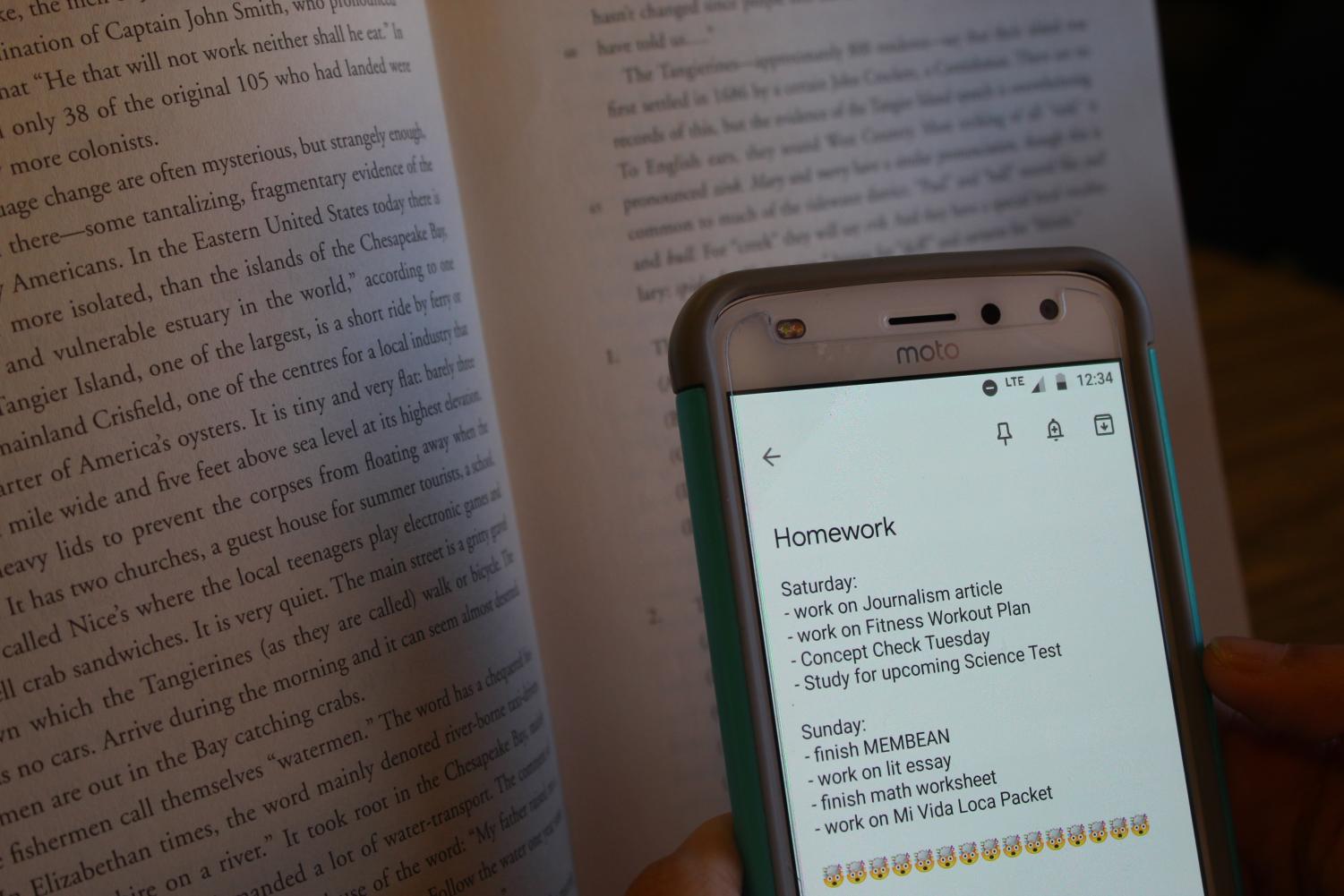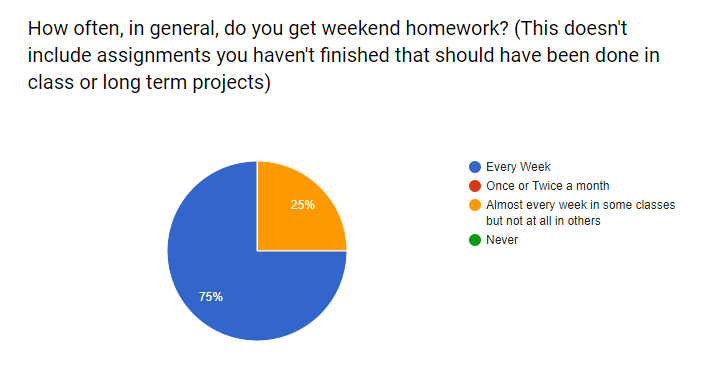Teachers vs. Students: Weekend homework
April 8, 2019
After climbing up the precipitous mountain that is the school week, Friday awaits students like a rewarding jewel. For many students, weekends are a refresh button on school, tests, assignments, and life. However, this idyllic weekend is a rarity for most high school students. Homework assigned over the weekend is one of the more controversial topics in education today, with opinions ranging all across the spectrum.
Pros and Cons
There is a schism between people who think weekend homework should be banned and those who think it should be mandatory; both sides have strong reasoning and arguments. The following chart shows the pros and cons of weekend homework:
Weekend Homework by naisharoy
Because general arguments for the topic can be supported from both sides, the benefits of it are situational. It is essential to pay attention to individual schools, teachers, and students when deciding whether or not it is necessary.
The Teachers’ Take
Teachers at South Forsyth seem to have an opinion about weekend homework. Some think it is necessary, others optional, and others think it shouldn’t be assigned at all. In a weekend homework survey of teachers, about 20% of Sofo teachers give no homework over the weekend. Out of the 80% that do, almost 50% try to avoid it when necessary, and 29% only assign a couple of times per month. Most teachers try to avoid giving weekend homework unless necessary. They mostly assign it as extra practice or make-up work. According to Learning Lift Off, one huge reason for teachers giving weekend homework is to complete their lesson plans. Many teachers simply don’t have enough class time in order to complete their assigned plans and have no choice but to assign weekend homework.
This view is shared by many teachers. Oftentimes, weekend homework won’t be assigned unless a test is on Monday. Even then the homework is often optional, like study guides. Bobby Scott, Headmaster of Perimeter School in Johns Creek, explains how the minimal homework policy at his school helped kids gain more quality time with their parents, improving mental health. Academically, while weekend homework does provide a review for the lessons of the previous week, many students procrastinate, doing it on Sunday night. This provides no academic value because students aren’t doing it to learn or review; they are doing it simply to get it done.
This is a very valid perspective on the situation. According to goodschools.org, homework (as long as it’s minimal) can help improve time management, studying, and engagement skills. A little homework on the weekends means that students will have to figure out how to fit it in with their lives, just as adults have to do with their jobs (which often extend beyond the office). Education.com explains that “homework can involve parents in the school process, [..] allowing them to express positive attitudes toward the value of school success,” which means that students can, using homework, foster more connections with their parents, and improving their mental health.
Describing homework as a “necessary evil” is probably one of the most common takes on the situation. Oftentimes, teachers need to assign homework in order to make sure students are prepared. However, this leads to additional stress for high school students who are already juggling work, college applications, relationships, and a lot more. The Washington Post wrote an article highlighting a school which started implementing homework-free weekends. Both students and teachers described it as a “breather” and “reprieve”. The exception and not the norm is a good rule of thumb for weekend homework. A few stressful weekends may help improve time management, but too many may open the door to depression and anxiety.
The responsible high school student may be able to do all these activities. However, it takes lots of time to develop the responsibility and mindset required for this. A common solution would be to gradually increase the amount of weekend homework as students get more responsible and learn how to manage it. For example, teachers may start by assigning 5-10 minutes of homework per weekend and gradually increase their time as students grow, instead of assigning a huge amount all at once. Doing a little homework each night (or completing a subject each night) is also a good strategy, and responsible students will ask teachers for studying strategies, homework advice, and extensions.
The Students Side
Unlike the teachers at South Forsyth, the students seemed to have unanimous answers to the survey. The majority of them reported having weekend homework consecutively over the weeks. However, it was different for each subject. The following graphs show what weekend homework looks like at South:
After looking at this survey, it is easy to see that for the average high school student, a homework-free weekend is a rarity. Math is the subject where students get the most weekend homework assigned. This is understandable because math is a class that requires intensive practice and skill building. However, students often have tests on Mondays, which means that they get overloaded with both studying, doing homework, and spending time with their family. In addition, many students feel that all their assignments can be overbearing when they have no choice but to extend the work onto their two-day reprieve. The biggest annoyance for students at South Forsyth is busy work. Homework can be useful at times, however if the assignment is lengthy or tedious, it gets lost in all the other pending work.
“[One suggestion for teachers would be] to not give as many or lengthy assignments, because we need a break from school; if we are bombarded with work from all classes it gets difficult,” says junior Arusha Khan.
Solutions
School districts across the US have started implementing homework-free weekends as a method to aid their students’ stress and give them a breather. By having a balance of having homework on weekends occasionally, teachers can still fulfill their curriculum. These periodic breaks can give students relief from homework or extra time to catch up on assignments. Schools that have started incorporating this practice into their schedule include Watkins Mill High and Poolsville High in Maryland, Ramapo Indian Hills High School in New Jersey, Hinsdale High School in Chicago, and many more. South Forsyth can also utilize this strategy by offering students one or two completely homework-free weekends twice a year or so. We can make students’ lives easier by increasing motivation for all the other all-nighters. One strategy that the video to the right highlights is for students is to plan their homework. Students can also break down their homework and do a little each night to avoid the situation of weekend homework altogether, or at least prevent all the work from piling up to 11:59 on a Sunday night.

